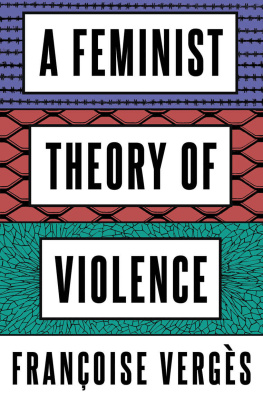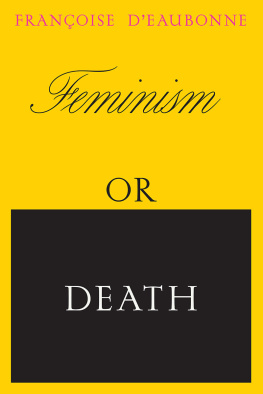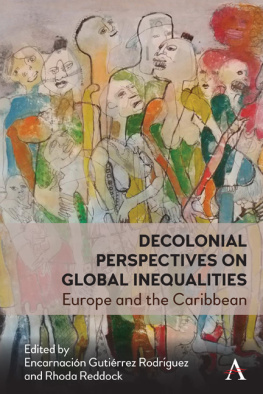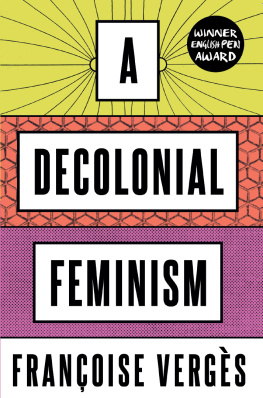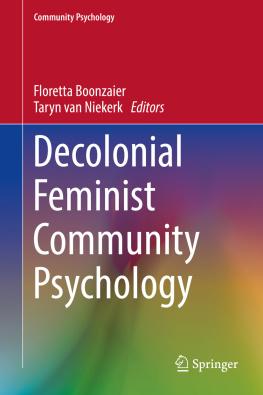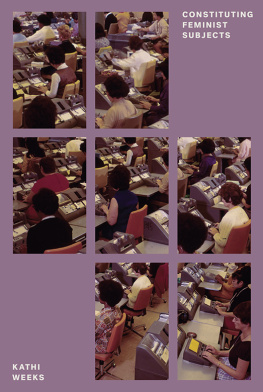Françoise Vergès - A Feminist Theory of Violence: A Decolonial Perspective
Here you can read online Françoise Vergès - A Feminist Theory of Violence: A Decolonial Perspective full text of the book (entire story) in english for free. Download pdf and epub, get meaning, cover and reviews about this ebook. year: 2022, publisher: Pluto Press, genre: Politics. Description of the work, (preface) as well as reviews are available. Best literature library LitArk.com created for fans of good reading and offers a wide selection of genres:
Romance novel
Science fiction
Adventure
Detective
Science
History
Home and family
Prose
Art
Politics
Computer
Non-fiction
Religion
Business
Children
Humor
Choose a favorite category and find really read worthwhile books. Enjoy immersion in the world of imagination, feel the emotions of the characters or learn something new for yourself, make an fascinating discovery.
- Book:A Feminist Theory of Violence: A Decolonial Perspective
- Author:
- Publisher:Pluto Press
- Genre:
- Year:2022
- Rating:5 / 5
- Favourites:Add to favourites
- Your mark:
- 100
- 1
- 2
- 3
- 4
- 5
A Feminist Theory of Violence: A Decolonial Perspective: summary, description and annotation
We offer to read an annotation, description, summary or preface (depends on what the author of the book "A Feminist Theory of Violence: A Decolonial Perspective" wrote himself). If you haven't found the necessary information about the book — write in the comments, we will try to find it.
A Feminist Theory of Violence: A Decolonial Perspective — read online for free the complete book (whole text) full work
Below is the text of the book, divided by pages. System saving the place of the last page read, allows you to conveniently read the book "A Feminist Theory of Violence: A Decolonial Perspective" online for free, without having to search again every time where you left off. Put a bookmark, and you can go to the page where you finished reading at any time.
Font size:
Interval:
Bookmark:
In this robust, decolonial challenge to carceral feminism, Franoise Vergs elucidates why a structural approach to violence is needed. If we wish to understand how racial capitalism is linked to the proliferation of intimate and state violence directed at women and gender-nonconforming people, we need to look no further than Vergs timely analysis.
Angela Y. Davis, Distinguished Professor Emerita, University of California, Santa Cruz
A powerful and uncompromising text A stunning reflection on the recurrence of assaultgender-based, sexual, racial violence.
Terrafemina
An important and courageous book, which raises difficult questions and uncovers invisible structures of domination.
Trou Noir
Vergs incandescent writing casts a light on the global inequalities, brutal carceral systems, unfettered militarization, and punitive ideologies that shape violent intimacies.
Laleh Khalili, Professor of International Politics, Queen Mary University of London
A call to join in the urgent decolonial feminist work of rethinking the practices of (so-called) protection outside of the logics of violence. We have the ability, Vergs insists, to enact a post violent society, to bring another world into being.
Christina Sharpe, Canada Research Chair in Black Studies in the Humanities, York University, Toronto and author of In the Wake: On Blackness and Being
A road map of radical emancipatory imaginaries for shaping urgent social and political change. Vergs arguments rise from the ground up, from the lived experience of grassroots dissent, action and mobilization against the wounds and damages inflicted by extractive capitalism across the world.
Rasha Salti, curator of art and film
A Decolonial Feminism
A vibrant and compelling framework for feminism in our times.
Judith Butler
A powerful tool of social transformation.
Djamila Ribeiro, Brazilian human rights activist
Incisive an invitation to reconnect with the utopian power of feminism.
Aurelien Maignant, Fabula
A powerful work.
Les Inrocks
Develops a critical perspective on feminism to reconsider the conditions of possibility and purpose resituates feminism in a truly political, emancipatory and critical dimension.
Jean-Philippe Cazier, Diacritik
Essential for highlighting the current divisions within feminist political agendas, and for collective reflection on a profound, radical transformation of society Necessary reading.
Axelle n219
Theory of Violence
A Decolonial Perspective
Franoise Vergs
Translated by Melissa Thackway

First published 2020 as Une Thorie fministe de la violence by La Fabrique ditions English language edition first published 2022 by Pluto Press
New Wing, Somerset House, Strand, London WC2R 1LA
www.plutobooks.com
Copyright La Fabrique ditions, 2020; English language translation copyright Melissa Thackway 2022
Cet ouvrage a bnfici du soutien du Programme daide la publication de lInstitut franais

This book has been selected to receive financial assistance from English PENs PEN Translates programme, supported by Arts Council England. English PEN exists to promote literature and our understanding of it, to uphold writers freedoms around the world, to campaign against the persecution and imprisonment of writers for stating their views, and to promote the friendly co-operation of writers and the free exchange of ideas. www.englishpen.org

The right of Franoise Vergs to be identified as the author of this work has been asserted in accordance with the Copyright, Designs and Patents Act 1988.
British Library Cataloguing in Publication Data
A catalogue record for this book is available from the British Library
ISBN 978 0 7453 4568 0 Hardback
ISBN 978 0 7453 4567 3 Paperback
ISBN 978 0 7453 4571 0 PDF
ISBN 978 0 7453 4569 7 EPUB
This book is printed on paper suitable for recycling and made from fully managed and sustained forest sources. Logging, pulping and manufacturing processes are expected to conform to the environmental standards of the country of origin.
Typeset by Stanford DTP Services, Northampton, England
Simultaneously printed in the United Kingdom and United States of America
Race, Patriarchy, and the Politics
of Womens Protection
Reports about all forms of violence are so numerous every day, that the feeling that what I wrote a year ago is already obsolete has been haunting. Yet, that feeling should be resisted. What I wrote in 2020 on structural and systemic violence still stands: neoliberal capitalism, racism, imperialism, white supremacy and patriarchy, homophobia and transphobia, are showing their insatiable appetite for domination and oppression. The Western way of life, adopted now also by elites in the Global South, rests on the normalization of violence, on making violence not only inevitable but also necessary. Images of what is shown as the good life abound in glossy magazines, in films, or in TV seriesclean neighborhoods, houses with luxurious gardens, healthy children laughing while playing on clean beaches, women doing yoga in serene landscapes, hipsters with trimmed beards that do not get them racially profiled, vacations in beautiful places from which the poor are evicted, white saviors doing good deeds, electric cars to save the planet, leisure that cultivates ones mind, food that is grown with respect to the planet They construct a visual world that adheres to a beauty and harmony which masks its attending violence. Its protection is then presented as the fight of civilization against barbarism, plagues, violence, gangs, violence against women and girls. Protection is understood in the colonial tradition: keep the barbarians at the gates; militarize the public space; create social, environmental, and cultural segregation; use artwashing, politics of bourgeois respectability and white feminism to justify this segregation. The wealth that has allowed this good life was accumulated thanks to the extraction of cheap energy (coal and hydrocarbons), the looting and plundering of natural resources by colonial powers. The well-being of European and North American populations was built at the expense of the colonized world. This good life, that reveals a constant stark inequality between North and South, rests on the super-exploitation of the Global Souths resources, on the exhaustion, until premature death, of the life force and energy of Black and brown peoples. That it must be protected by all means is taken for granted, for is it not the sign of progress and civilization, and the object of envy and desire by the rest?
Violence is consubstantial to racial capitalism; it is not something that comes afterwards, the act of some extreme groups. Ecosystem degradation is accelerated by capitalism, which intensifies pollution and waste, deforestation, land-use change and exploitation, and carbon-driven energy systems. Rape, land theft, genocide, massacres, assassinations, destruction of public services, processes of enslavement, creation of private militias, torture, censorship, have always been the tools of colonialism and capitalism disguised as civilizing missions or humanitarian interventions. Imperialist wars leave behind ruins, pollution, devastation and misery and their end means that war is pursued through other means. Afghanistan, Palestine, Iraq, are the current names of this kind of war.
Font size:
Interval:
Bookmark:
Similar books «A Feminist Theory of Violence: A Decolonial Perspective»
Look at similar books to A Feminist Theory of Violence: A Decolonial Perspective. We have selected literature similar in name and meaning in the hope of providing readers with more options to find new, interesting, not yet read works.
Discussion, reviews of the book A Feminist Theory of Violence: A Decolonial Perspective and just readers' own opinions. Leave your comments, write what you think about the work, its meaning or the main characters. Specify what exactly you liked and what you didn't like, and why you think so.

